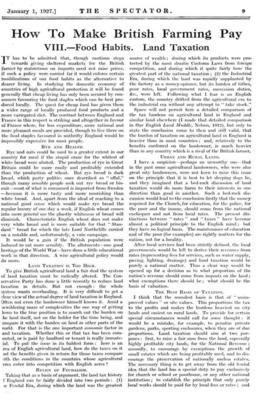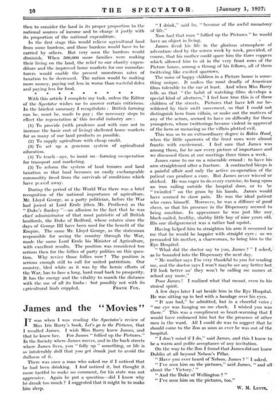How To Make British Farming Pay
VIII.—Food Habits. Land Taxation IT has to be admitted that, though cautious steps towards giving sheltered markets for the British farmer by restrictions on imports need not raise prices, if such a policy were carried far it would enforce certain Modifications of our food habits as the alternative to dearer living. In studying the domestic economy of countries of high agricultural protection it will be found generally that cheap living has only been secured by con- sumers favouring the food staples which can be best pro- duced locally. The quest for cheap food has given them .a wider range of locally produced food products and a more variegated diet. The contrast between England and France in this respect is striking and altogether in favour of France where, for less expenditure, more rational and more pleasant meals are provided, though to live there on the food staples favoured in unthrifty England would be impossibly expensive for most people.
RYE AND HEALTH.
Rye and oats could be used to a greater extent in our country for meal if the stupid craze for the whitest of white bread were abated. The production of rye in Great Britain could be more easily and profitably extended than the production of wheat. But rye bread is dark bread, which party politics once described as " offal," Though many sensible people seek out rye bread or bis- cuit—most of what is consumed is imported from Sweden —because it is more tasty and more nourishing than white bread. And, apart from the ideal of reaching to a national good sense which would make rye bread the regular luxury of one day a week, if English wheat comes into more general use the ghastly whiteness of bread will diminish. Characteristic English wheat does not make very white bread and is more suitable for that " Stan- dard " bread for which the late Lord Northcliffe carried on a notable and, unfortunately, a vain campaign.
It would be a gain if the British population were induced to eat more sensibly. The allotments—one good heritage of the World War—have done a little educational work in that direction. A wise agricultural policy would do more.
LAND TAXATION IS Too HIGH.
To give British agricultural land a fair deal the system of land taxation must be radically altered. The Con- servative Party has done a little recently to reduce land taxation in details. But not enough : the whole system wants overhauling. It is very difficult to get a dear view of the actual degree of land taxation in England. Dften not even the landowner himself knows it. Amid a bewildering maze of complexities the one way of getting 'own to the true position is to search out the burden on :he land itself, not on the holder for the time being, and :ompare it with the burden on land in other parts of the vorld. For that is the one important economic factor in and taxation. Whether this or that tax has been cora- anted, or is paid by landlord or tenant is really immate- ial. To put the issue in its baldest form : here is an Ina of English agricultural land, how do the taxes on it ,nd the benefits given in return for those taxes compare pith the conditions in the countries whose agricultural ores enter into competition with English acres ?
RELICS OF FEUDALISM.
Taking that as a basis of argument, the land tax history f England can be fairly divided into two periods : (1) le Feudal Era, during which the land was the greatest source of wealth ; during which its products were pro- tected by the most drastic Customs Laws from foreign competition, and during which it quite fairly bore the greatest part of the national taxation ; (2) the Industrial Era, during which the land was rapidly supplanted by the factory as a money-spinner, but its burden of tithes, poor rates, local government rates, succession duties, &c., were left. Following what I fear is an English custom, the country drifted from the agricultural era to the industrial era without any attempt to " take stock."
Space will not permit here a detailed comparison of the tax burdens on agricultural land in England and similar land elsewhere (I made that detailed comparison in Our English Land Muddle, Nelson, 1912), but only to state the conclusion come to then and still valid, that the burden of taxation on agricultural land in England is heavier than in most countries ; and, relatively to the benefits conferred on the landowner, is much heavier than in any country which is a rival of the British farmer.
URBAN AND RURAL LANDS.
I have a suspicion—perhaps an unworthy one—that in the past some agricultural landowners, who were also great city landowners, were not keen to raise this issue on the principle that it is best to let sleeping dogs lie, and they imagined that a bed-rock discussion of land taxation would do more harm to their interests in one direction than good in another. Such a bed-rock dis- cussion would lead to the conclusion firstly that the money required for the Church, for education, for the police, for the poor and the insane, should come from the national exchequer and not from local rates. The present dis- tinctions between " rates " and " taxes " have become almost a political principle to the English mind ; but they have no logical basis. The maintenance of education and of the poor (for examples) are rightly matters for the nation, not for a locality.
After local services had been strictly defined, the local governments would be left to derive their revenues from rates (representing fees for services, such as water supply, paving, lighting, drainage) and land taxation would be purely a national matter. Thus a clear way would he opened up for a decision as to what proportion of the nation's revenue should come from imposts on the land ; what exemptions there should be ; what should be the basis of valuation.
THE BEST BASIS OF TAXATION.
I think that the soundest basis is that of " unim- proved values " or site values. This proportions the tax to the profits and makes the burdens heaviest on city lands and easiest on rural lands. To provide for certain special circumstances would call for some thought : it would be a mistake, for example, to penalize private gardens, parks, sporting enclosures, when they are of due proportions. Land taxation should aim at two pur- poses : first, to raise a fair sum from the land, especially highly profitable city lands, for the National Revenue; secondly, to encourage by exemptions the growth of small estates which are being profitably used, and to dis- courage the preservation of nationally useless estates. The necessary thing is to get away from the old feudal idea that the land has a special duty to pay exclusively for church or school or poorhouse, or any other national institution ; to establish the principle that only purely local works should be paid for by local fees or rates ; and then to consider the land in its proper proportion to the national sources of income and to charge it justly with its proportion of the national expenditure.
In the first stage this would relieve agricultural land from some burdens, and those burdens would have to be carried by others. But very soon the burdens would diminish. When 500,000 more families were making their living on the land, the relief to our charity expen- diture and the improved home markets for our manufac- turers would enable the present monstrous rates of taxation to be decreased. The nation would be making more money, paying out less in worse than wasteful doles and paying less for food. * * * * * With this article I complete my task, unless the Editor of the Spectator wishes me to answer certain criticisms. In the briefest summary I recapitulate : British farming can be, must be, made to pay ; the necessary steps to effect the regeneration this invalid industry are : (1) To provide (with prudence and with care not to increase the basic cost of living) sheltered home markets for as many of our land products as possible.
(2) To supply agriculture with cheap credit.
(3) To set up a generous system of agricultural education.
(4) To teach—aye, to insist on—farming co-operation for transport and marketing.
(5) To reform the system of land tenures and land taxation so that land becomes an easily exchangeable commodity freed from the survivals of conditions which have passed away.
During the period of the World War there was a brief recognition of the national importance of agriculture. Mr. Lloyd George, as a party politician, before the War had jeered at Lord Ernle (then Mr. Prothero) as the " Duke's flunkey "—an allusion to the fact that he was chief administrator of that most patriotic of all British landlords, the Duke of Bedford, whose estates since the days of George III have been used for the benefit of the Empire. The same Mr. Lloyd George, as the statesman responsible for seeing the country through the War, made the same Lord Ernle his Minister of Agriculture, with excellent results. The position was considered too serious then for the follies of party politics on this ques- tion. Why revive those follies now ? The position is serious enough still to call for united patriotism. Our country, bled white as it was by the heroic efforts of the War, has to face a long, hard road back to prosperity. It has the energy and the vitality to march the distance with the use of all its limbs : but possibly not with its



































 Previous page
Previous page